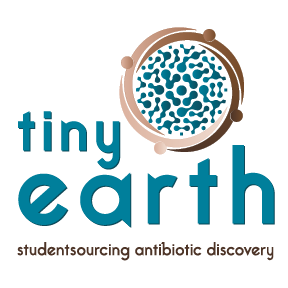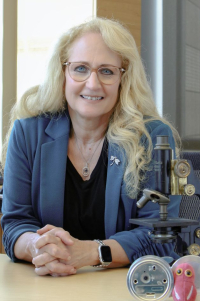Tiny Earth Chemistry Hub (TECH)
The Tiny Earth Chemistry Hub (TECH) brings student-based discovery to new heights. TECH was established in 2018 at the Wisconsin Institute for Discovery as part of the “Science and Discovery” core of Tiny Earth. Multidisciplinary approaches allow TECH to go beyond what can be accomplished in one semester and move the network closer to discovering the next antibiotic.
TECH’s growing isolate collection includes nearly 4,400 strains from over 32 institutions. The variety of soil environments, culture conditions, and isolates is a rich asset to TECH and its mission of antibiotic discovery. These isolates are evaluated and prioritized based on activity profiles, genomic, and metabolomic data and some are scaled up for structural elucidation.
The Tiny Earth Chemistry Hub always welcomes collaborators in its quest to discover novel antibiotic compounds. Get in touch today!
TECH is…
» a research arm of Tiny Earth
» part of an academic lab
» an interdisciplinary team
» a discovery pipeline
Antibiotic Pipeline
Instructors
Worldwide network of instructors teach evidence-based hands-on science.
Students
Students study microbes from local soils with interactive research.
Database
Pathogen-inhibiting isolates are recorded in the global Tiny Earth Database and shared.
Chemistry Hub
Students share samples with the Chemistry Hub scientists for genomic and metabolomic analysis.
Antibiotic Structures
Identifying antibiotic compounds to combat the resistance crisis.
Contributing to TECH Research
Institutions participating in Tiny Earth and those interested in our research may considering collaborating with the Tiny Earth Chemistry Hub by sending notable bacteria isolates with antimicrobial activity to our laboratory at the University of Wisconsin–Madison. At TECH, scientists analyze isolates’ chemical, genomic, and phenotypic profiles and elucidate their secondary metabolites.
Instructors: Visit the TEPI Website for more information and instructions on send your students’ isolates to TECH.
Quick Documents
Not a TEPI, but interested in sending isolates? Check with TECH!
Email tinyearth@wid.wisc.edu for questions and inquiries.
Tiny Earth Database
The Tiny Earth Database holds records of soil samples, culture conditions, and inhibitory bacteria that have been isolated from all over the world and is critical for discovering new antibiotics.
It standardizes record keeping and allows information to be shared with the entire Tiny Earth network, including the Tiny Earth Chemistry Hub. The public-facing side of the database is used for genomic research, classroom studies, and more as students search for discovery patterns and novel compounds.
The Tiny Earth Chemistry Hub uses the Database for accurate record keeping, comparisons to previous activity and results, and will be used to share information with users in the future.





